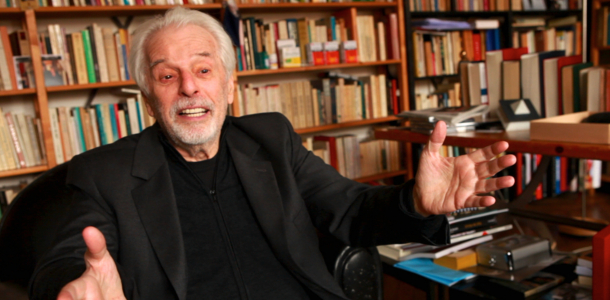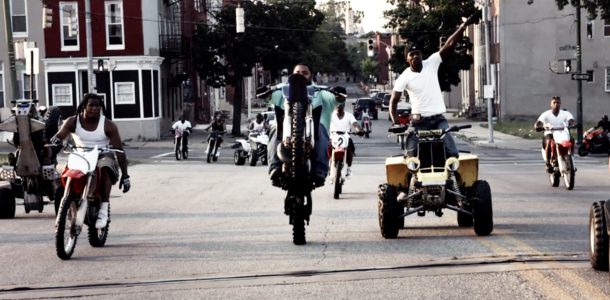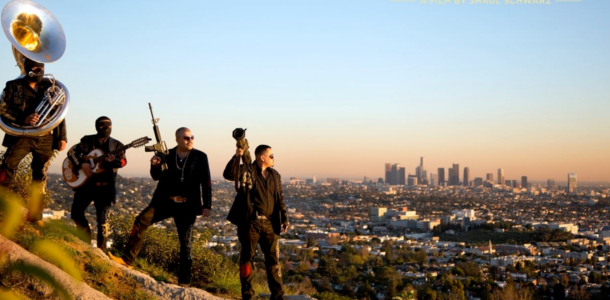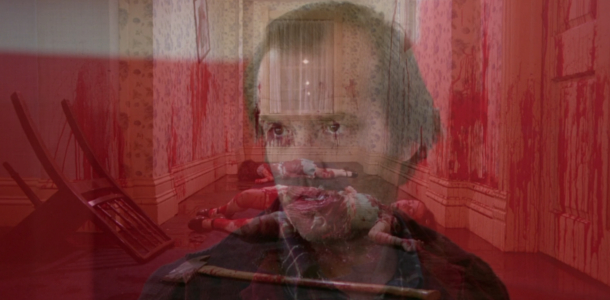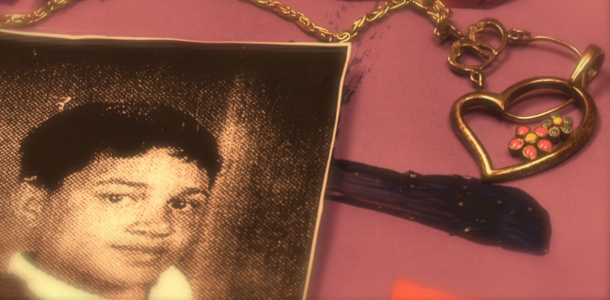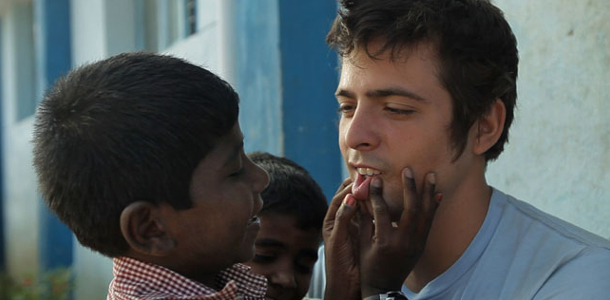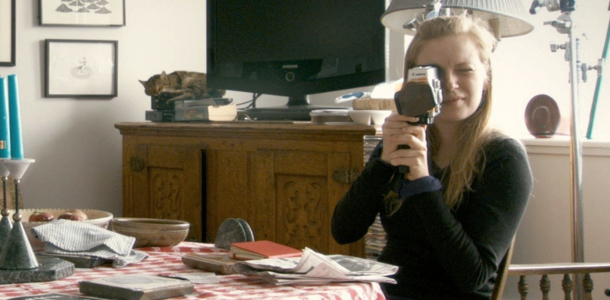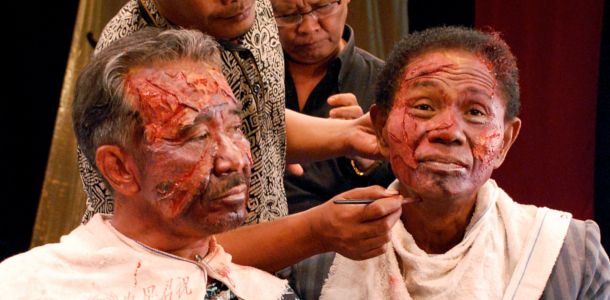As Moore’s Law has continued to raise the quality and lower the cost of AV equipment, and more fledgling filmmakers have dipped their feet in the fountain of non-fiction, there’s been much talk about us being in the midst of a new golden age of documentary filmmaking. Now, lofty statements like these generally wind up being little more than buzzword attractions meant to set the blogosphere aflame, but this year has undoubtedly been a stellar year for the non-fiction form. From politically shattering investigations to form flexing art films to immensely personal portraits, not only are documentaries making a major impact on the ol’ festival circuit – Sundance, Tribeca, Hot Docs, SXSW, AFI Docs – many fest favorites from last year have had considerable success this year in art house theatres, not just in NYC & LA, but in some cases nationwide – not an easy feat.
Of the lengthy list of documentaries I’ve been lucky enough to bear witness to so far this year, I’ve whittled it down to the absolute must sees, some still making the festival rounds, some soon to hit a theatre or VOD service near you. This list sees first time directors like Marta Cunningham and Lotfy Nathan mix with the likes of proven veterans Alex Gibney and AJ Schnack as they continue to do what they do best. So, without further ado, the must see documentary films of 2013 so far, from great to breathtakingly crucial:
#16. We Steal Secrets: The Story of Wikileaks
Docu veteran Alex Gibney dives headlong into the brief history of the whistleblowing website via it’s arrogant public face, Julian Assange, and the man behind the actual military leaks, Bradley Manning. Taking pains to set the stage within the digital realm in which much of the film takes place, the director condones the free flow of information while calling attention to the conundrum that Assange calls for absolute truth from others while he himself seems to shift in the murk of deceit. Here’s my review, plus interview with Alex Gibney on the film:
#15. Jodorowsky’s Dune
This is the stuff of Hollywood legend resurrected as pure non-fiction fun. After amassing an insane cast of characters (David Carradine, Salvador Dalí, Orson Welles, Mick Jagger) and craftsmen (Dan O’Bannon, H.R. Giger, and Chris Foss, all of future Alien fame), the cult director Alejandro Jodorowsky forged ahead with his psychedelic adaptation of Frank Herbert’s epic sci-fi novel, but every major studio failed to back the project. In Frank Pavich’s fantastic doc about the film’s failure, Jodorowsky is allowed to tell the story himself with trademark delirium and vivacity. (My Review)
#14. Expedition to the End of the World
Employing the tried and true reality TV formula of grouping character archetypes together for extended periods of time to see what naturally happens, Daniel Dencik’s latest docu transcends its small screen credo by selecting brilliant scientists, artists, anthropologists, biologists, geographers and philosophers and placing them on a crooner bound expedition to the uncharted wilderness of Greenland. Their extended journey and natural interactions constantly foster existential conversation while faced with the sheer immensity, beauty and isolation of nature. My review plus interview with Daniel Dencik on the film:
#13. The Machine Which Makes Everything Disappear
In her subtlety penetrating portrait of modern Georgian youth, docu director Tinatin Gurchiani found her subjects by placing an ad for a film audition. Those who attended were stood starkly before the lens, set against vividly painted walls long haunted by the decay of age, and interviewed about why they wanted to appear in a movie. With the wit and introspection of a seasoned psychologist, Gurchiani finds the pulse of a troubled rural nation in this startlingly simple examination of her home country. (My Review)
#12. 12 O’Clock Boys
Lotfy Nathan’s vivacious portrait of motorbike bound Baltimoreians began as a scholastic project about the anomalous 12 O’Clock Boys, a police taunting group of stunt riders, but developed into something much deeper after the filmmaker befriended an effortlessly personable 13 year old rider named Pug. Depicting the inherent dangers and prevailing allure of dirt bike riding through populous city streets while portraying the tragic inevitabilities of growing up in the poverty stricken city, Nathan’s debut proves to be a stylish bit of non-fiction filmmaking that flourishes in the subversion of lawlessness with an empathetic reflection of youth in transition. Here’s my review plus interview with Lotfy Nathan on the film:
#11. Cutie and the Boxer
Zachary Heinzerling’s intimate profile of the Neo-Dadaist artist Ushio Shinohara and his talented, devoted wife, Noriko is, at its heart, the struggle of an artist’s life style in conflict with the structure of marriage. The Shinohara’s have been together for decades, creating their artwork in tandem while trying to raise a son and manage Ushio’s continued alcohol abuse, all the while maintaining the subsistence of struggling artists. With stunning cinematography and an appreciation for their struggles, Heinzerling depicts their strife with the same sense of tragi-comedy the couple seems to hinge their lives on. His film is equal parts magnetic humor, reminiscent animation, and overwhelming tragedy. Here’s my review plus interview with Zachary Heinzerling and the Shinoharas on the film. Opens on Friday, August 16 in NY at the Lincoln Plaza Cinema and Landmark Sunshine Cinema. A national rollout will follow.
#10. Caucus
AJ Schnack has been a busy man as of late releasing We Always Lie To Strangers and acting as the leader of the documentary focused Cinema Eye Honors, but it’s his nod to on-the-ground political docs Primary and The War Room that he returns to the docu-forefront with this warmly humanizing depiction of the 2011-12 Republican race in Iowa. By following his subjects for weeks on end and staying long after the mainstream media packed up and went home, Schnack and his producing partner Nathan Truesdell saw the facade of politicians fall away to reveal the true hearts, minds and awkward humor of these odd men and women who beg, borrow and steal for the public approval of power. Despite your own political leanings, you’ll find a horse in this race to root for.
#9. American Promise
Both a video scrapbook of their child’s educational experience and a social experiment meant to question the significance of skin color in modern day schooling, filmmakers Joe Brewster and Michele Stephenson’s latest is a personal epic that examines the many differences between public and private schools with pointed poignancy. Their cheerfully charming son Idris and his good natured friend Seun were filmed over the course of twelve years, lending loads of heart and personality to a film rooted deep in social examination. Accustomed to the presence of a camera, the growing kids are candidly emotive at all times – at home, school, social events, etc – making for an affecting and important piece of homemade cinema. (My Review)
#8. Narco Cultura
Like his embedded journalist contemporaries Jeremy Scahill, Sebastian Junger or the late Tim Hetherington, director Shaul Schwarz can’t seem to stay away from danger for fear of missing a story as it unfolds in the midst of battle. With his debut docu feature, Schwarz takes us into the murder capital of the world, Juárez, Mexico, where the drug cartels hold a tight grip of terror on the struggling bordertown. Contrasting the devastation of the cartels with the morbid fascination of narco inspired pop culture that has followed in its wake, the film follows a Juárez C.S.I. officer over the course of months, as well as a family bearing narco singer who makes a living by promoting the horrors of drug culture just across the border in El Paso. Schwarz’s debut is a shocking study of the cartels’ widespread reign of terror and influence. Here’s my interview with Shaul Schwarz:
#7. Room 237
Ever see Kubrick’s ingeniously twisted take on Stephen King’s The Shining? Interested in conspiracy theories? Like film criticism? If you answered yes to any of these, you should seek out Rodney Ascher’s intensely obsessive examination of Kubrick’s puzzlebox horror film immediately. With hilariously alluring hypotheses, Ascher allows his infatuated subjects to examine the film frame by frame, forwards, backwards, and even forwards and backwards at the same time. Is it a film meant to subtly suggest Kubrick’s involvement in creating the supposed faux moon landing footage? Is the film a lamentation of the Holocaust? Is that skiing poster on the wall actually a subconscious reference to the Minotaur that Jack has become? This mirthfully open-minded associative analysis is what cinephiles live for and it is exactly what makes Ascher’s film such a blast. Here’s Blake Williams’s review and coverage from the Directors’ Fortnight Q&A in Cannes:
#6. Valentine Road
Few seem to remember seeing any mainstream media coverage of when an openly gay eighth grader named Larry King was shot in the back of the head by fellow student Brandon McInerney in the middle of class on February 12, 2008, in Oxnard, California. With heartrending empathy and a boldly subjective stance, director Marta Cunningham revisits the tragedy knowing in her heart that not only is the murder of an innocent child is absolutely monstrous, but putting a child in jail for over two decades serves little to right the wrong either. Her exquisite debut is a powerful examination of intolerance and a worrisome documentation of cultivated bigotry. Here’s our interview with Marta Cunningham on the film.
#5. Dirty Wars
Rick Rowley’s latest docu investigation blows the lid off of America’s ever expanding covert war efforts by featuring the brave man behind the break of Blackwater, Jeremy Scahill. While headlines seem to focus on an omniscient terrorist threat, Scahill found that the US has been more than bending the rules of military engagement, killing innocents in fruitless night raids and extravagantly covering its tracks, hoping no one with the balls to expose their moral incomprehensibilities would take the effort to put all the pieces together. Within, Scahill travels the globe, risking his career and very life to unveil a war being waged on the sly by our government. Constructed as a gorgeously lensed thriller (taking home the Sundance Cinematography prize earlier this year), Rowley’s film proves the existence of the kill happy Joint Special Operations Command (JSOC) and asks us to hold our military responsible for the inexcusable atrocities they’ve committed.
#4. Leviathan
This year’s quintessential art doc, Lucien Castaing-Taylor and Verena Paravel’s follow-up to Sweetgrass is the only film on this list that absolutely engulfs you in the experience it works to convey. With a myriad of weather-proof digital cameras strapped to a North American trolling ship, the film documents the grotesque nature of commercial fishing with the grainy high-contrast visuals of a shipwrecked acrobat. We slosh about the deck bathed in the blood of countless sea creatures and watch weathered men be pelted by an ever present downpour as hungry gulls flutter against a black sky hoping to score a scrap of remains. This is Deadliest Catch without the embellishments of competition, personality or theme music – a purely guttural experience to be had. Here’s Eric Lavallee’s review.
#3. Blood Brother
Though centered around the misery of HIV/AIDS, Steve Hoover’s debut feature is absolutely, positively bursting with life. Several years prior to its existence, his best friend Rocky found himself disconnected with his suburban existence, so he decided to drop everything and move to India with the hope of finding something real to reinvigorate him. Rocky didn’t expect that something to be a compound for women and children suffering from HIV/AIDS, but after a brief visit he seemed to have found his life’s calling in caring for the brave and adoring kids. Employing his stylized commercial chops to bring Rocky’s story to life, Hoover has crafted a deeply affecting, boldly vivacious tale of profound empathy, endless soul searching and emotional trauma that pervades the same hopefulness that Rocky seems to harness. Here’s my review and interview with Steve Hoover on the film:
#2. Stories We Tell
Spoiling the plotty pleasures of actor/director Sarah Polley’s personal investigation of her beloved network of kin would not diminish the wonders that inhibit her latest and greatest film, and yet, it will remain unspoiled here. Though Polley’s true intentions lie in the unearthing of long buried family history, what she teases out in playfully serious interrogation and constructs into a multi-layered account of mixed perspective turns out to be far more interesting than the story itself. Her bygone family affairs metamorphosize into a stunning examination of storytelling itself, how memories traverse time and space as both heartbreaking and heartwarming visions of a past shaped by one’s own singular perspective. Together, these fractured bits of memory form an exquisite, essential piece of non-fiction filmmaking that Polley should be immensely proud of.
#1. The Act of Killing
There is nothing in the history of cinema that seems a fitting comparison to Joshua Oppenheimer’s utterly insane new film which asks former Indonesian death squad leaders to replicate their real life mass murders through the traditional cinematic methods of the silver screen legends they modelled their own killings after. We witness the public celebration of their despicable deeds – on television, in the streets, on film – but under the hardened layer of detached ruthlessness remains a lingering regret that can only be conjured from within. Executive produced by docu legends Werner Herzog and Errol Morris, the film aches of the supreme oddity and storytelling prowess both filmmakers are renowned for. Fortunately, Oppenheimer transcends the comparative promotion, lensing the most politically subversive, emotionally poignant, brilliantly bizarre documentary of the year.



